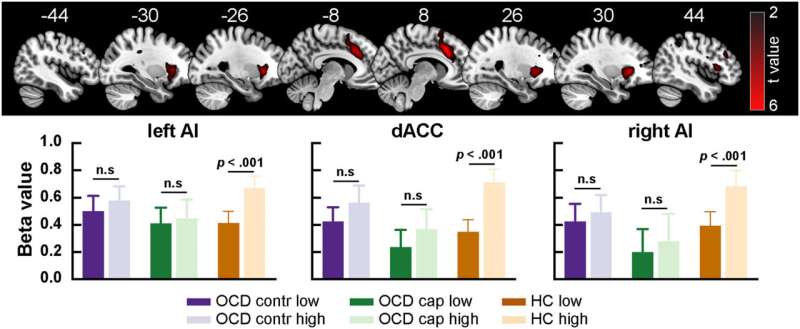This article has been reviewed according to Science X's editorial process and policies. Editors have highlighted the following attributes while ensuring the content's credibility:
fact-checked
trusted source
proofread
New neural insights into processing uncertainty in obsessive-compulsive disorder

Obsessive-compulsive disorder (OCD) is a neurological disorder characterized by repeated behaviors such as cleaning and checking despite clear objective evidence of cleanliness, orderliness, and correctness. Although the disease is often mischaracterized as a disorder of "fussiness," the disorder actually stems from difficulty in processing uncertainty. However, the neural underpinnings of that aberrant processing remains unknown.
Now, a new study in Biological Psychiatry: Cognitive Neuroscience and Neuroimaging uses brain imaging to get a closer look at the underpinnings of uncertainty processing in OCD.
The authors, led by Valerie Voon, Ph.D., from the University of Cambridge, studied a group of patients with OCD, another group of patients with severe OCD who had undergone a therapeutic surgical procedure called capsulotomy, which is thought to decrease OCD-related brain activity, and healthy controls. In addition to investigating brain processing in OCD, the researchers also wanted to examine the effects of capsulotomy on processing.
Dr. Voon explained, "We used a simple card gambling task like that commonly used in drinking games. Participants faced with an open card simply bet whether they thought the next card would be higher or lower than the open card. At the extremes, with high or low open cards, certainty is high, but uncertainty was much higher with cards near the middle of the deck."
For the functional magnetic resonance imaging (fMRI) experiments, the researchers focused on brain areas implicated in decision making, namely the dorsal anterior cingulate cortex (dACC) and the anterior insula (AI). Participants with OCD displayed aberrant activity in this circuitry compared to healthy controls while determining certainty.
Dr. Voon said, "Critically, patients with OCD showed slower decision making, but only when the outcomes were more certain. Because these impairments appeared in both the OCD patients and those who had improved after capsulotomy surgery, that suggests this cognitive mechanism might be a core feature underlying why OCD develops, irrespective of how severe the symptoms might be."
Dr. Voon added, "The imaging data may provide a representation of how OCD patients might struggle with their symptoms. Whereas healthy individuals might be able to say, 'this is clean' and stop cleaning, people with OCD might struggle with that sense of certainty, and perhaps spend more time wondering 'is this still a bit dirty, or is this clean enough,' and clean further."
The findings make clear that OCD is not a disorder of over-cleanliness but one of disordered brain processing of certainty.
Cameron Carter, MD, Editor of Biological Psychiatry: Cognitive Neuroscience and Neuroimaging, said of the work, "This very interesting study provides an important new perspective on the mechanism underlying the disabling symptoms of OCD and suggests that developing new therapies targeting uncertainty processing in the disorder, as well as the neural systems underlying these processes, such as the dACC and AI, may offer new hope to those suffering from this difficult to treat and disabling disorder."
More information: Yi-Jie Zhao et al, Evidence Accumulation and Neural Correlates of Uncertainty in Obsessive-Compulsive Disorder, Biological Psychiatry: Cognitive Neuroscience and Neuroimaging (2023). DOI: 10.1016/j.bpsc.2023.05.011


















